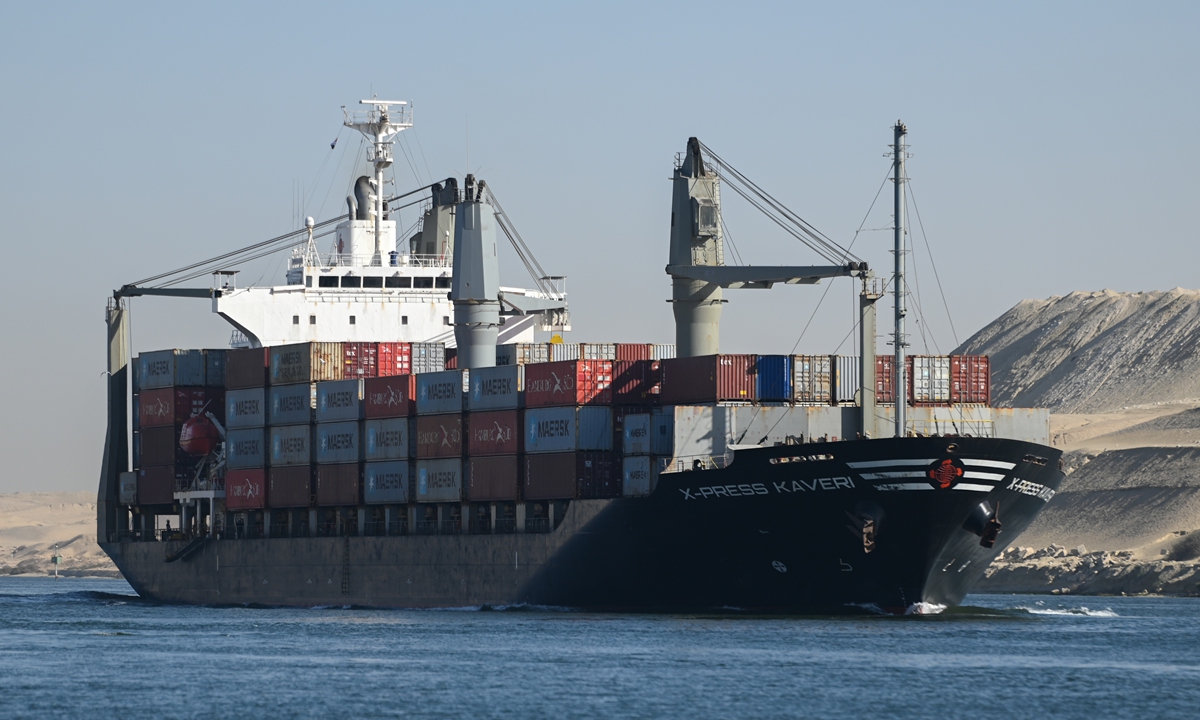Chinese-invested shipping company opens regular liner service in Red Sea region, one of the few that still operate Asia-Europe direct route

A ship transits the Suez Canal towards the Red Sea on January 10, 2024 in Ismailia, Egypt. Photo:VCG
A Chinese-invested shipping company Sea Legend has opened regular container shipping service via the Red Sea region, according to the company’s website announcement, which industry insiders said would make it one of the few companies that still sail on the direct shipping route from Asia to Europe on heels of the deepening of Red Sea shipping crisis.
According to a schedule posted on the website of Sea Legend, it has arranged eight container ship routes via the Red Sea region in January, a traditional Chinese cargo shipment peak season ahead of the eight-day Spring Festival holidays that start from February 10.
The company said all the eight vessels will be escorted by the “Chinese Navy Flotilla 118.” It also listed a number of security measures, including being equipped with commercial armed escort, razor wire protection along freeboard, latching each entrance of passageway, as well as chaining up to shut every door to cabin.
An anonymous manager of Sea Legend was quoted as saying in media reports that the firm is the “only” company that offers weekly liner service in the Red Sea region. He said strengthened safety measures have added up transportation cost by 30 percent to 40 percent compared with the situation before the outbreak of crisis, news website caixin.com reported.
The company has been applying to Chinese escort fleets stationed in Djibouti for escort, and it arranges container ships to follow the escort fleet through dangerous regions based on the monthly escort schedule announced by the Chinese Navy, the manager said.
A staff member from a freight agency in Xiamen, East China’s Fujian Province, responsible for Sea Legend’s cargo space booking in the surrounding area, told the Global Times on Friday that the most recent ship, which departed from Qingdao, East China’s Shandong Province and stopped-over in Xiamen, has been heading to the Mediterranean via the Red Sea region on Thursday.
All containers reserved for overseas destinations at the vessel have been booked, according to him. The staff member added that containers at another ship via the Red Sea, which will leave Qingdao port on January 29, have also been fully booked up.
“Those ships will be escorted by Chinese Navy, providing guarantees on both safety and efficiency,” the staff member said.
The Red Sea is one of the most important arteries in the global shipping system and global supply chain, with one-third of all container traffic flowing through it. About 40 percent of Asia-Europe trade usually passes through the region, according to Euronews.
Most global shipping firms have suspended Red Sea routes in recent months and ships were re-routed around the southern tip of Africa, or the Cape of Good Hope. The Global Times learned from industry insiders that the shift in transport route has led to a delay of goods shipments from Asia to Europe by 10 to 14 days, and a double in cost.
Sea Legend was registered in Singapore and the company has gained international liner business certificates from China’s Ministry of Transport in February 2023. The company opened seaborne route from China to eastern Mediterranean named FMED last year, and after the Red Sea crisis, it has added several ports in the Red Sea region, including Jeddah Islamic Port in Saudi Arabia, Port of Sohar in Egypt and Aqaba Portin Jordan, to the FMED route, caixin reported.
China’s Ministry of Commerce (MOFCOM) said in January that it will strengthen coordination with relevant departments, closely follow dynamic development and provide help for foreign companies in a timely manner.
“The Red Sea region is an important global trade passage. It is hoped that relevant parties will restore and ensure the safety of the region from the point of maintaining the safety and stability of the region as well as the common interests of global society, and jointly maintain the smooth flow of global supply chain and the normal order of global trade,” MOFCOM said.
